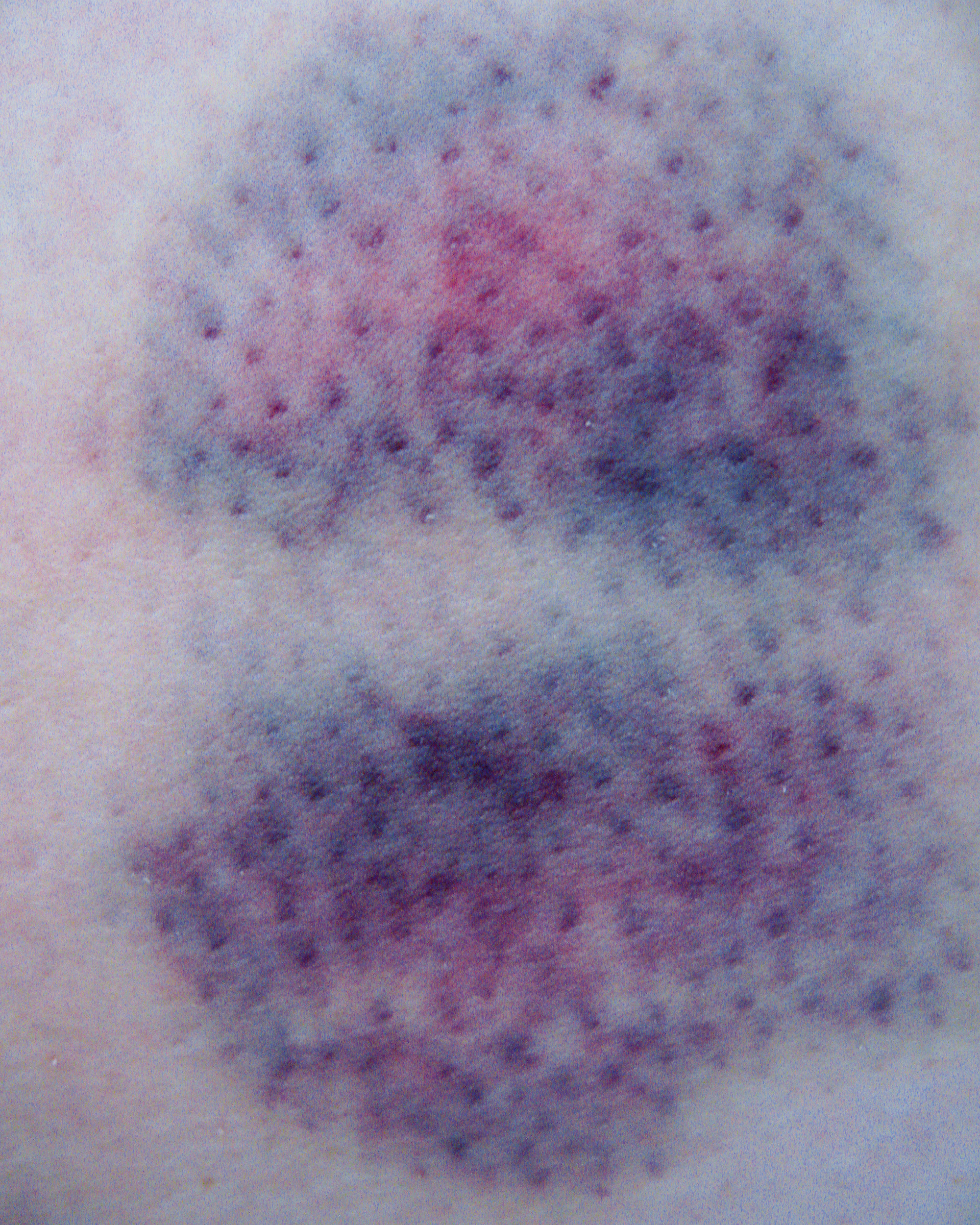Inventory / A Taxonomy of Bruises
Flesh and blood
Dominic Pettman
“Inventory” is a column that examines or presents a list, catalogue, or register.
The short text that follows has intrigued, confused, and provoked scholars since its discovery in the Eastern Arabah archaeological digs, near the ancient city of Petra, in 1844. The dispute continues regarding precisely how to categorize it, an irony lost on no one, given that the text itself is explicitly dedicated to the act of categorization. The Latin script, dating from the twelfth century AD, is based on an original Arabic source text dated approximately two hundred years earlier. The recovered text was inscribed on the finest vellum (suggesting official patronage) and was remarkably well preserved in a garnet-encrusted bronze cylinder apparently designed for just this purpose. Authorship was almost certainly collective, comprised of Persians of the cosmopolitan Sufi persuasion, and possibly including at least one learned soul from the West, who may have provided a subtle strain of neo-Aristotelianism. (Such collaborations were reasonably common, up until the Crusades.) Certain interweavings of monism, occasionalism, and other heterodoxies reinforce this hypothesis, given that no single religious or philosophical orientation can be definitively obtained (much as the experts try). The rather risky—not to mention risqué—topic of the flesh is clearly contextualized within a Christian sensibility, yet threatens to escape at any moment into the more sensual register of the Song of Solomon or certain pseudo-Islamic homages to terrestrial pleasure. One aspect of this anomalous work upon which the scholars do agree is the remarkable form of the taxonomy itself, which anticipates the system usually attributed to Linnaeus. In any case, the text is a suggestive sketch and should be of interest to the archaeologist and anthropologist, as much as to the physician and philosopher. This scholastic exercise stands alone as a quiet murmur within our species’ ongoing obsession with placing kind with kind, and separating goats from sheep, wheat from chaff, night from day, and love from less exalted types of attraction. If nothing else, for the amateur reader, Partitio Contusionum (“A Taxonomy of Bruises”)—presented overleaf in a translation from the late nineteenth century—can form the basis of spirited discussion for one’s next dinner party or tiresome train journey.

Those trained in the arts of Hippocrates will tell you that a bruise is caused neither by a sharp object, nor a light one, but one of a blunt and heavy disposition. The skin must not break or lacerate, but remain in plane, to act as cover for the local injury beneath, swelling and darkening black and purple, like a storm cloud trapped inside the body of young and old alike. (Unlike the peach, the bruises of men heal—or at least the majority do, of those we have so far inventoried.) But here the physicians are indifferent and uncurious, content to treat one such contusion as another. The learned, however, who ever seek wisdom, are not content with such simple appraisals, and offer this taxonomy of bruises as a gift to descendants of a similar spirit, to supplement as they see fit.
contusio cruris: a bruise of the leg (lower)
contusio femoris: a bruise of the leg (upper)
contusio pygae: a bruise of the buttocks
contusio manus: a bruise of the hand
contusio brachii: a bruise of the arm (lower)
contusio lacerti: a bruise of the arm (upper)
contusio alvi: a bruise of the torso (front)
contusio tergi: a bruise of the torso (back)
contusio colli: a bruise of the neck
contusio vultus: a bruise of the face
contusio palma: a bruise caused by an open hand
contusio pugno: a bruise caused by a closed fist
contusio inquisitione obscura: a bruise caused by searching for an object in the dark
contusio supellectile inaspecta: a bruise caused by clumsiness, inflicted by tables, chairs, furniture, or door-frames
contusio grave demisso: a bruise caused by dropping a heavy object
contusio halucinatione: a bruise resulting from daydreaming or slowness of mind
contusio casu: a bruise caused by falling (for instance, from a ladder)
contusio accidente: a bruise caused by accident, inflicted by another (for instance, an overzealous gesture)
contusio bubla: a bruise caused by one’s livestock
contusio equitatione: a bruise caused by the riding of a horse
contusio religiosa: a bruise resulting from religious fervor or penance
contusio conjuge exacerbato: a bruise caused by the hand of one’s husband or wife, for being disagreeable
contusio parente: a bruise caused by the hand of one’s father or mother, for being disobedient
contusio avunculo: a bruise caused by one’s uncle, for being lazy
contusio originis obliterate: a bruise for which one can no longer remember the cause
contusio inscrutabilis: a bruise for which one never understood the cause
contusio affectu malo: a bruise resulting from ill humor
contusio ludo stulto: a bruise resulting from horseplay
contusio natalis: a bruise which peaks on the day of one’s own birth
contusio coagmentata naevo: a bruise which overlaps with a birthmark
contusio celata: a bruise concealed through the artful application of powders or paste
contusio peregrinationis: a bruise brought back from travels afar
contusio incestus: a bruise which invites the kiss of a cousin
contusio nuptialis: a bruise received on one’s wedding night
contusio amplexu magno: a bruise resulting from an excessive e